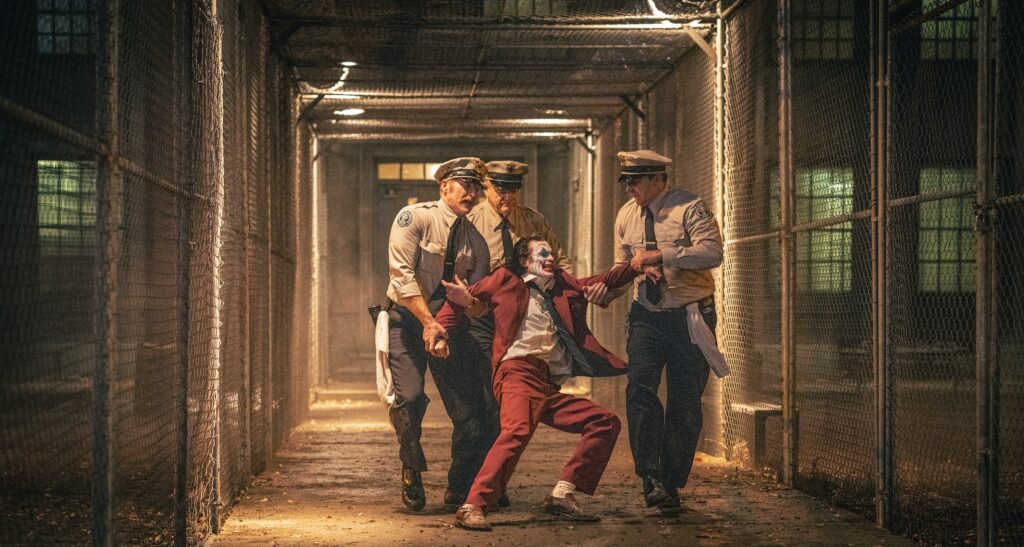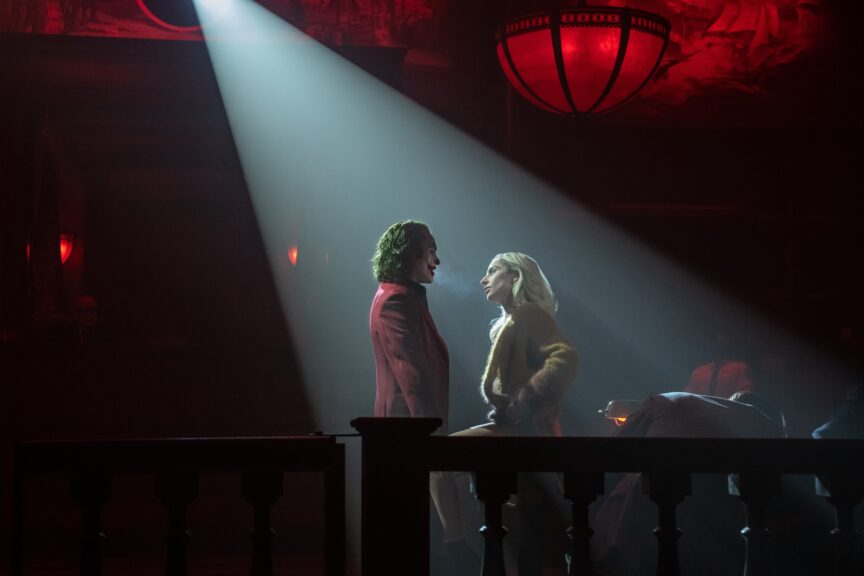Director Todd Phillips ditched laughter for tears with 2019’s “Joker.”
The mind behind “The Hangover” franchise, “Old School” and more got fed up with woke comedy restrictions and joined the superhero craze.
On his terms.
His “Joker” became a sensation, earned star Joaquin Phoenix a Best Actor Oscar and proved there’s more to superhero films than CGI dustups.
The media tried to turn “Joker” into an incel warning, but when the film refused to spark violence journalists moved on to other false narratives.
One thing was clear. An encore was inevitable.
“Joker: Folie à Deux” defies superhero norms. Again. No action sequences, lycra-clad heroes or tired genre tropes. Phillips even made it a musical, tasking stars Phoenix and Lady Gaga to play out their tortured romance in song.
Two-plus hours later, you’ll still wonder why they bothered.
The first “Joker” delivered a brutal study of a man in psychological agony. Arthur Fleck’s transformation into the Joker happened because society pushed him to the boundaries. The health care system failed him. His co-workers couldn’t empathize with his middling comedy career.
Bullies pounced and seized at will. And, eventually, he snapped. Or, to be more specific, he opened fire.
That arc touched on societal critiques that spiked the narrative punch. “Folie à Deux” revisits some of those themes but adds precious little to the franchise.
Arthur is being held at a mental institution (Arkham style!) following the events of the 2019 film. He faces the death penalty for killing five people, although the law doesn’t realize he also killed his Ma. His lawyer (Catherine Keener) wants to improve his public image in the hopes of avoiding the electric chair.

Joaquin Phoenix in “Joker: Folie à Deux” (2024). DC Entertainment. Warner Bros. Pictures. IMDB.
The guards at the institution try to pry jokes from Arthur.
All Arthur wants is to smoke every cigarette within reach. This film loves smoking in ways that would make Joe Camel blush.
Meanwhile, society has made Arthur a hero of sorts. He fought back against The System on his terms. They even made a TV movie about his transformation.
That warped fame draws the attention of a fellow patient, Harleen “Lee” Quinzel (Lady Gaga). That’s Harley Quinn, of course, one of the micro-nods to the comic book source material.
The other? Harry Lawtey’s Harvey Dent is the prosecutor hoping to end the Joker’s reign.
Lee is drawn to Arthur’s anti-social Joker and he’s just happy to have a woman look his way. Can their bond survive the trial and their self-defeating ways? What are the stakes in said trial, anyway?
Phillips cast convention aside the first time around. Now, he’s doubling down in his cinematic sandbox. The film begins with an animated short featuring the Joker and his mischievous shadow.
Huh?
The musical numbers, drawn in naturalist fashion and relying on classic tunes like “That’s Entertainment” and “If My Friends Could See Me Now,” offer modest rewards. Phoenix isn’t a singer but throws himself into the unorthodox dancing.
Lady Gaga is squarely in her element, but the film won’t embrace the full musical charms that Gene Kelly and Judy Garland embraced. “Joker: Folie à Deux” is surprisingly lifeless despite two charismatic stars and a bracing origin story.

Joaquin Phoenix and Lady Gaga in “Joker: Folie à Deux” (2024). DC Entertainment. Warner Bros. Pictures. IMDB.
Steve Coogan appears as a tabloid journalist eager to make Arthur summon the Joker for his audience. It’s all about ratings and The Narrative, not the truth. Is Phillips, who co-wrote the screenplay with Scott Silver, mocking corporate journalism?
Maybe. Likely. The scene ends and the film drops that criticism cold.
Other scenes depict how society continues to keep poor Arthur down. The asylum’s security guards, including a brute played by the great Brendan Gleeson, use Arthur to further their own ends.
And? Prison guards routinely behave badly on screen and, we’re sure, sometimes off-screen. What’s so different, or meaningful, here?
The most memorable moment brings back actor Leigh Gill, whose character witnessed one of the Joker’s killings in the first film. The haunted soul describes to the courtroom how the tragedy left him fearful of everyday life.
Gill’s performance chills. We’re reminded what the real-world implications of worshiping a serial killer are. “Joker” made us mourn a sick man’s descent into madness. We rooted for him to find some sort of comfort or healing. That never materialized.
The sequel marinates in the idea that this fallen man matters. He has a purpose, a mission beyond himself. His fame alone makes him worth our admiration.
He’s suddenly … cool. No. And there’s no oversized Bat to put him in his place.
Moral complexities could have powered “Folie à Deux.” There’s a reason we hoped Tony Soprano could stay one step ahead of The Law. Instead, we get a lethargic courtroom trial, a romance with little heat and a third act that proves the sequel never had a plan in the first place.
Am I Racist? Is In Theaters NOW — Get Your Tickets Here!
There’s no denying “Folie à Deux” looks magnificent. The dream sequences marry the film’s gritty aesthetic with old Hollywood panache. Phillips’ camera captures every scene for maximum impact, crafting indelible images along the way.
The film’s waning moments seem like they’re building to something mythical, a rationale for everything we’ve just witnessed. Instead, what follows erases the modest goodwill already generated.
“Joker” reinvigorated the comic book movie. “Joker: Folie à Deux” reminds us that sequels for sequels’ sake only taint the original.
* * *
Christian Toto is an award-winning journalist, movie critic and editor of HollywoodInToto.com. He previously served as associate editor with Breitbart News’ Big Hollywood. Follow him at @HollywoodInToto.
The views expressed in this piece are those of the author and do not necessarily represent those of The Daily Wire.

Continue reading this exclusive article and join the conversation, plus watch free videos on DW+
Already a member?


